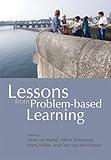Lessons from Problem-Based Learning / edited by Henk van Berkel ... [et al.].
Material type: TextPublication details: Oxford ; New York : Oxford University Press, c2010.Description: x, 267 p. : ill. ; 26 cmISBN:
TextPublication details: Oxford ; New York : Oxford University Press, c2010.Description: x, 267 p. : ill. ; 26 cmISBN: - 9780199583447 (hardback)
- 0199583447 (hardback)
- 610.76 22 LES
| Item type | Current library | Call number | Status | Barcode | |
|---|---|---|---|---|---|
 Short Loan Books
Short Loan Books
|
Hamu Mukasa Library - Law and Science section; Level 3 Closed Access l Short Loan | 610.76 LES (Browse shelf(Opens below)) | Available | 156758 |
Includes bibliographical references and index.
Machine generated contents note: -- 1. Introduction; sustainability of PBL and innovation in medical education at Maastricht University, Stewart Mennin 2. History of problem-based learning in medical education, Harry Hillen, Albert Scherpbier & Wynand Wijnen 3. The problem-based learning process, Diana Dolmans & Henk Schmidt. Designing a problem-based learning medical curriculum, Mascha Verheggen & Hetty Snellen 5. Designing problems, Henk Schmidt & Jos Moust 6. The role of a tutor, Jos Moust 7. Basic sciences in problem-based learning, Esther Bergman & Ton de Goeij 8. The introduction of real (ambulatory) patients early in the curriculum, Agnes Diemers, Erik Heineman & Diana Dolmans 9. Simulated patients, Lonneke Bokken & Jan-Joost Rethans 10. Skills training, Robbert Duvivier, Jan van Dalen, Pie Bartholomeus, Maarten Verwijnen & Albert Scherpbier 11. Communication skills, Robbert Duvivier, Jan van Dalen & Jan-Joost Rethans 12. Learning how to learn, teaching how to teach, Emmaline Brouwer & Marijke Kruithof 13. E-learning, Jeroen Donkers, Danielle Verstegen, Bas de Leng & Nynke de Jong
14. Alternative instructional problem-based learning formats, Jos Moust & Herma Roebertsen 15. How to organize the transition from a traditional curriculum to a PBL curriculum, Martin Paul 16. Curriculum governance, Ineke Wolfhagen & Albert Scherpbier 17. Quality assurance, Renee Stalmeijer, Diana Dolmans, Henk van Berkel & Ineke Wolfhagen 18. Faculty development, Marie-Louise Schreurs & Willem de Grave 19. The institutialization of student participation in the evaluation: From passionate volunteers to skilled students delegates, Fred Stevens, Marre Andree Wiltens & Krista Koetsenruijter 20. Hybrid learning spaces; learning resources and facilities, Gaby Lutgens, Fons van den Eeckhout & Jeroen ten Haaf 21. Assessment, Lambert Schuwirth & Cees van der Vleuten 22. Progress testing, Arno Muijtjens & Wynand Wijnen 23. Research in education, Cees van der Vleuten, Diana Dolmans & Jeroen van Merrienboer 24. A review of the evidence: effects of problem-based learning on students and graduates of Maastricht Medical School, Henk Schmidt 25. Internationalization, Gerard Majoor & Susan Niemantsverdriet 26. A role for problem-based learning in higher education in the developing world, Gerard Majoor & Han Aarts.
"Problem-based learning (PBL) has excited interest among educators around the world for several decades. Among the most notable applications of PBL is the approach taken at the Faculty of Health, Medicine and Life Sciences (FHML) at Maastricht University, the Netherlands. Starting in 1974 as a medical school, the faculty embarked on the innovative pathway of problem-based learning, trying to establish a medical training program which applied recent insights of education which would be better adapted to the needs of the modem physician. The medical school, currently part of the FHML, can be considered as an 'established' school, where original innovations and educational changes have become part of a routine. The first book to bring this wealth of information together, "Lessons from Problem-based Learning" documents those findings and shares the experiences of those involved, to encourage further debate and refinement of problem-based learning in specific applications elsewhere and in general educational discussion and thought. Each chapter provides a description of why and what has been done in the Maastricht program, followed by reflection on the benefits and issues that have arisen for these developments. The final section of the book examines the application of PBL in the future, and how it is likely to develop further"--Provided by publisher.
There are no comments on this title.
